100 Film Favorites – #4: Fight Club
(David Fincher, 1999)
 Now that Halloween season has come and gone, we return to the much anticipated final posts in the 100 Film Favorites Countdown. Even though at least one astute reader among you has already deduced the remaining Top 3 posts still to come, I’ll try to make them interesting all the same.
Now that Halloween season has come and gone, we return to the much anticipated final posts in the 100 Film Favorites Countdown. Even though at least one astute reader among you has already deduced the remaining Top 3 posts still to come, I’ll try to make them interesting all the same.
Ladies and gentlemen, I’m about to talk about Fight Club.
Yes, I realize I’m breaking the first two rules.
A brief note here: Both “Fight Club” and my next selection feature pivotal twist endings. Thus, both this and the following entry may be slightly shorter than other recent posts, so as to avoid spoilers.
Fight Club, based on Chuck Palahniuk’s 1996 novel of the same name, opens, chronologically speaking, with its unnamed protagonist (Edward Norton) suffering from insomnia. An automobile safety inspector, he constantly jets across the country, analyzing car accidents and calculating whether monetary losses due to potential lawsuits justify his company’s issuing a recall. This detached view toward human suffering combines with his incessant jet-lag to instill in the narrator feelings of isolation and insignificance.
 The narrator’s doctor scoffs at his insomnia, and advises him to attend a support group for victims of testicular cancer, in order to see “real suffering” firsthand. At the meetings, the narrator discovers that pretending to be a victim himself allows him to experience an emotional connection with the other group members. This cathartic release in turn enables him to sleep. Soon, he becomes “addicted” to support groups, joining every one he can find and thriving off of the emotional bonds he forms under false pretenses. At each group (based around ailments from tuberculosis to blood parasites), he gives a different alias. Like the various group members, the viewer never learns his true name.
The narrator’s doctor scoffs at his insomnia, and advises him to attend a support group for victims of testicular cancer, in order to see “real suffering” firsthand. At the meetings, the narrator discovers that pretending to be a victim himself allows him to experience an emotional connection with the other group members. This cathartic release in turn enables him to sleep. Soon, he becomes “addicted” to support groups, joining every one he can find and thriving off of the emotional bonds he forms under false pretenses. At each group (based around ailments from tuberculosis to blood parasites), he gives a different alias. Like the various group members, the viewer never learns his true name.
Then Marla Singer (Helena Bonham Carter) shows up. Marla, like the narrator, is a “tourist.” A fellow support-group-addict, she compulsively attends meetings because “it’s cheaper than a movie and there’s free coffee.” With another impostor in the room, the narrator can no longer feel his emotional connection with the real victims, and his insomnia returns. Finally, he confronts Marla and they agree to “split the week,” attending different groups so as to avoid running into one another.
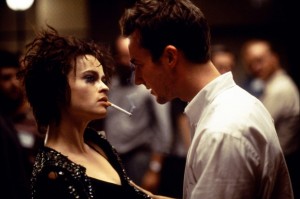 On one of his many business flights, the narrator meets Tyler Durden (Brad Pitt), the eccentric owner of the Paper Street Soap Company. Tyler is also an inveterate prankster, and takes many odd-jobs to facilitate his subtle acts of societal sabotage: As a projectionist, he splices frames of pornography into children’s films. As a waiter, he ejaculates into the clam chowder.
On one of his many business flights, the narrator meets Tyler Durden (Brad Pitt), the eccentric owner of the Paper Street Soap Company. Tyler is also an inveterate prankster, and takes many odd-jobs to facilitate his subtle acts of societal sabotage: As a projectionist, he splices frames of pornography into children’s films. As a waiter, he ejaculates into the clam chowder.
The narrator returns home to find that his apartment (and all his possessions) have been destroyed in a gas explosion. He briefly considers calling Marla for help, but opts to ask Tyler instead. At a bar, Tyler offers to let the narrator (who I’m just going to call Edward Norton from now on) to come live with him. But first, Tyler has one request. In the bar parking lot, he implores Edward Norton to “hit me as hard as you can.” A half-playful fistfight breaks out between the two men, and they make an interesting discovery: the fight feels surprisingly therapeutic. After all, as Tyler observes, “How much can you really know about yourself if you’ve never been in a fight?”
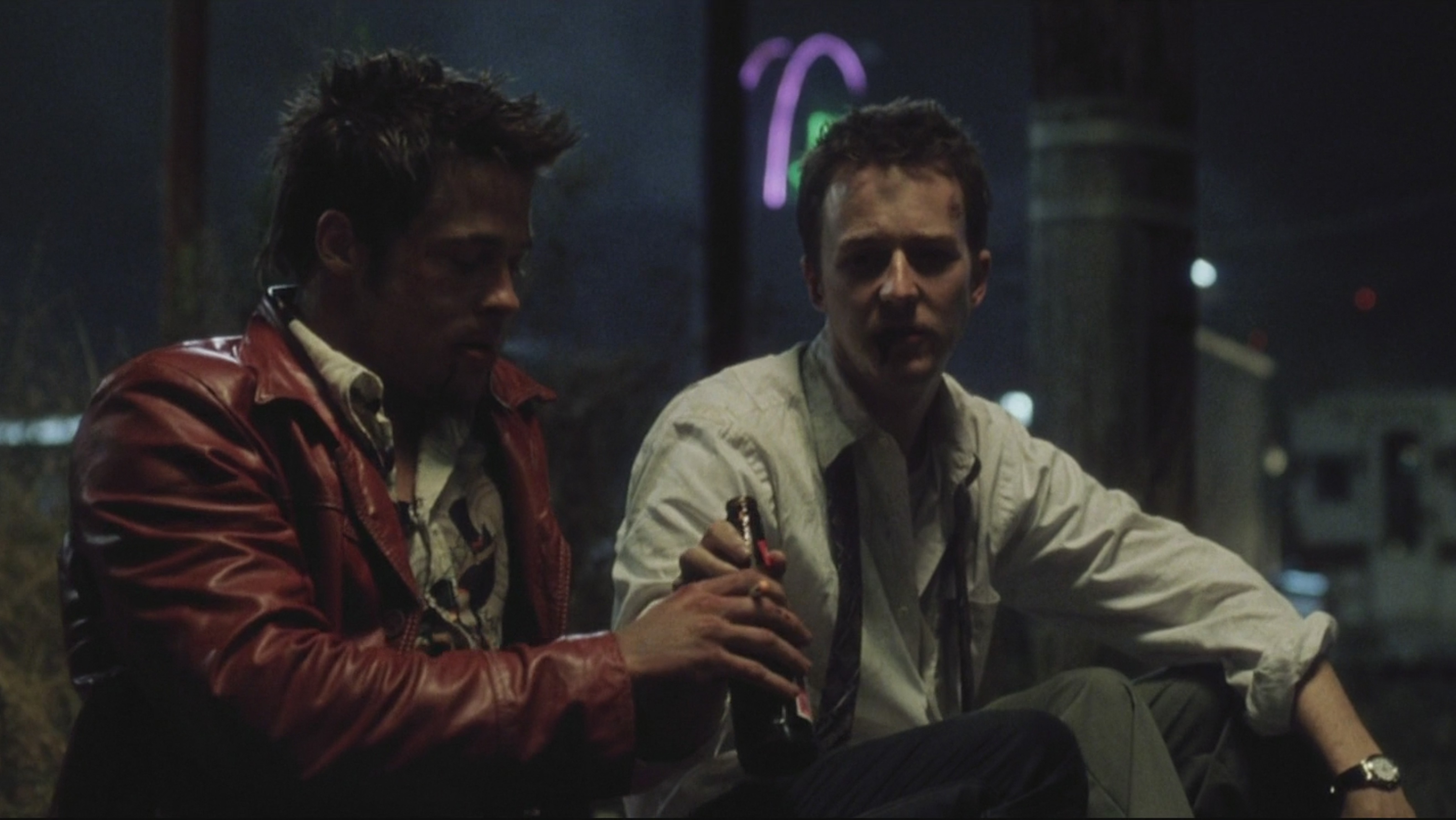 Tyler and Edward Norton incorporate bouts of this radical fight-therapy into their weekly routine. After several weeks, the fights begin drawing spectators. Before long, the spectators begin asking to join in. Soon, “Fight Club” is a weekly institution, offering men an outlet to vent their frustration with the repression and emasculation of the modern world. The Club is governed by eight simple rules:
Tyler and Edward Norton incorporate bouts of this radical fight-therapy into their weekly routine. After several weeks, the fights begin drawing spectators. Before long, the spectators begin asking to join in. Soon, “Fight Club” is a weekly institution, offering men an outlet to vent their frustration with the repression and emasculation of the modern world. The Club is governed by eight simple rules:
1. You do not talk about Fight Club.
2. You DO NOT talk about Fight Club.
3. If someone says “stop,” goes limp, or taps out, the fight is over.
4. Only two men to a fight.
5. One fight at a time.
6. No shirt, no shoes.
7. A fight will go on as long as it has to.
8. If this is your first night at Fight Club, you have to fight.
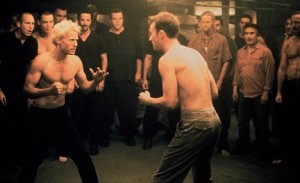 In between brawls, Tyler imparts his philosophy to Edward Norton and the ever-growing ranks of Fight Club members. According to Tyler, modern men have become soft, vacant slaves to materialism. Our “Ikea nesting instinct” drives us to pursue a corporately-defined image of success. In Tyler’s words, “we spend our lives working jobs we hate, to buy shit we don’t need.” Men must reject commercialism and the feminizing influence of their mothers to truly find themselves and realize their inner strength.
In between brawls, Tyler imparts his philosophy to Edward Norton and the ever-growing ranks of Fight Club members. According to Tyler, modern men have become soft, vacant slaves to materialism. Our “Ikea nesting instinct” drives us to pursue a corporately-defined image of success. In Tyler’s words, “we spend our lives working jobs we hate, to buy shit we don’t need.” Men must reject commercialism and the feminizing influence of their mothers to truly find themselves and realize their inner strength.
Edward Norton forms a close but bizarre frendship with Tyler Durden. One merry evening, Tyler invites him along to witness the soap-making process firsthand. Soap-making (or “saponification” for all you word nerds out there) requires rendering fat. Tyler uses only the highest-quality fat for his soap, which, it turns out, means he steals discarded human fat from liposuction clinics, “selling rich ladies their own fat asses back to them” once the soap is complete.
Another key component in the manufacture of soap is lye. In a particularly tense scene, Tyler pours intensely caustic lye powder over Edward Norton’s hand, then forcibly holds him down as he writhes in agony. Tyler insists that Edward Norton must discard the meditative and spiritual teachings of the support groups. He must live in the moment, embracing his physical experience of the world rather than distancing himself from it: “THIS is your pain, right here” he says. At last, Edward Norton steels himself and allows the powder to burn deep into his flesh, resulting in a hideous scar.
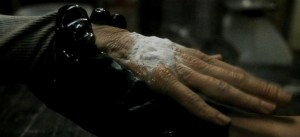 Edward Norton only starts to question the teachings of Tyler when Durden begins an affair with Marla Singer. Tyler saves her from a suicide attempt, and the two embark on a passionate fling which seriously cramps Norton’s style. Now isolated once again, feeling distanced from his one “friend” and the girl he kinda-sorta has feelings for, Norton stops to take a more critical look at the monster he helped Tyler create.
Edward Norton only starts to question the teachings of Tyler when Durden begins an affair with Marla Singer. Tyler saves her from a suicide attempt, and the two embark on a passionate fling which seriously cramps Norton’s style. Now isolated once again, feeling distanced from his one “friend” and the girl he kinda-sorta has feelings for, Norton stops to take a more critical look at the monster he helped Tyler create.
And quite a monster it is. Norton is surprised to find that Fight Clubs have sprung up on every day of the week, in multiple cities throughout the region. Things take a still more sinister turn when Tyler starts handing out “homework assignments.” These missions, initially fairly innocuous, are in the same vein as Tyler’s earlier pranks: soon Fight Club members are installing tire-damage spikes in parking lots and shaving zoo monkeys.
But the “assignments” grow more grand in scale and violent in nature, until what was once Fight Club has morphed into something called “Project Mayhem.” Though he considers himself as much a “founder” of Fight Club as Tyler, Edward Norton comes to realize that the “Project” has developed into a movement far beyond his understanding or control. Almost overnight, it seems, Tyler’s house has become a barracks for training “space monkeys,” hordes of recruits eager to militantly adhere to Tyler’s philosophy. Through Project Mayhem, Tyler charges this growing army to commit acts of domestic terrorism aimed at iconic corporations, with his end-goal the downfall of commercialism and capitalism. You see, a major byproduct of soap-making is glycerine. And, as the villain from The Legend of Zorro could tell us, it only takes a bit of chemical tweaking to turn glycerine to nitroglycerine – one hell of a tool for social upheaval.

Don’t take it so hard, man. Being strapped to the front of a bomb-train is a really cool way to die.
Ultimately, Edward Norton decides to rebel against the organization he has built…but it just might be too late. As he criss-crosses the country once more, following in Tyler’s wake, he learns that Fight Club has become a nationwide phenomenon. In every town, he’s hailed as a hero, and he receives many a covert wink from thoroughly-bruised (but enthusiastic) men. Many even bear distinctive lye scars on their hands. Can Norton bring down Tyler Durden’s empire, when those with the power to help (including droves of police officers) are themselves Project Mayhem members?
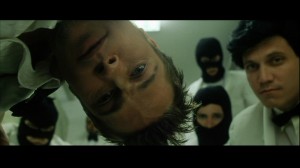
“The people you are after are the people you depend on: we cook your meals, we haul your trash, we connect your calls, we drive your ambulances, we guard you while you sleep. Do not fuck with us.”
And the challenge only grows more daunting when the final twist is revealed.
Like The Bridge on the River Kwai (or Choke, another of Palahniuk’s novels), I feel that much of Fight Club‘s punch comes from the fact that it lures us into identifying with a morally ambiguous character. In Kwai, Nicholson’s determination to build the bridge is initially presented as stemming from a desire to boost morale and represent the skill and dedication of British soldiers. But this depiction gradually devolves into a grim portrait of hubris, blatant collaboration, and abuse of the very soldiers Nicholson had originally sought to support. Similarly, Tyler and Edward Norton seem at first to have hit on a good thing with their Fight Club project. Like other support groups, it’s a form of collective therapy. It addresses social issues not currently being addressed by the “Ikea-driven” culture of materialism. Once we accept fighting as beneficial, we’re more willing to see Tyler’s other deviances in a positive light: Re-appropriating human fat is great! I mean, nobody’s using it. Chemical burns and self-mutilation are cool! They demonstrate dedication. Only when people start dying do we realize just how much of Tyler’s twisted rhetoric we’ve been “tricked” into swallowing.
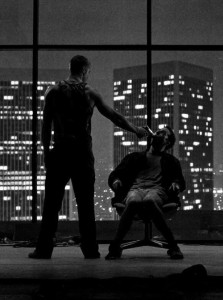 That said, Tyler raises some good points: So little of our modern life is “real” or visceral. Despite a super-saturation of “social media,” disconnection is increasingly the norm, both from one another and from the physical world and its physical sensations. Furthermore, as every subgroup of humanity seems of late to be mobilizing itself as a “movement” of some kind, what is the role of “men” in the scheme of things? In this day and age, what does it mean to “be a man?” In director David Fincher’s words, “We’re designed to be hunters and we’re in a society of shopping. There’s nothing to kill anymore, there’s nothing to fight, nothing to overcome, nothing to explore. In that societal emasculation this everyman [the narrator] is created.” And if the influence of things like mass media and materialism have changed what it means to “be a man” from the era of our fathers and grandfathers to today, why shouldn’t we do what we can to push back and reset the system?
That said, Tyler raises some good points: So little of our modern life is “real” or visceral. Despite a super-saturation of “social media,” disconnection is increasingly the norm, both from one another and from the physical world and its physical sensations. Furthermore, as every subgroup of humanity seems of late to be mobilizing itself as a “movement” of some kind, what is the role of “men” in the scheme of things? In this day and age, what does it mean to “be a man?” In director David Fincher’s words, “We’re designed to be hunters and we’re in a society of shopping. There’s nothing to kill anymore, there’s nothing to fight, nothing to overcome, nothing to explore. In that societal emasculation this everyman [the narrator] is created.” And if the influence of things like mass media and materialism have changed what it means to “be a man” from the era of our fathers and grandfathers to today, why shouldn’t we do what we can to push back and reset the system?
And yet, the film and novel never fully commit to Tyler’s views. Instead, these ideas are treated more complexly. As the snowballing influence of Project Mayhem illustrates, indulging in Tyler’s kind of thinking can lead you to some crazy, dark, and possibly evil places. Much of the popularity of Fight Club among young men likely spawns from the allure of Tyler’s iconoclastic philosophy. I must admit that I, too, feel the temptation that Tyler represents (If you’re thinking of getting a fight club together, let me know, okay? I just want to give it a try. Just once…). But Palahniuk and Fincher deserve kudos for making this a deep, introspective story, rather than just a “masculinist” rant. Fight Club explores the implications and possible consequences of going against society’s strictures, and doesn’t shy away from the fact that there IS such a thing as too much testosterone, aggression, and primal rage.
Now, I know that many of you reading this post have probably seen the film already, and may be interested in my thoughts on the twist ending. Well, I’m sorry, but this film is far too good to risk spoiling it for the uninitiated. Hopefully what I have written so far is enough to inspire you to see this film. It’s a compelling story which showcases some remarkable acting, and the dialogue is incredibly distinctive and memorable (almost pretentiously so).
 You should SEE THIS MOVIE. Love it or hate it, it will have an effect on you.
You should SEE THIS MOVIE. Love it or hate it, it will have an effect on you.
Oh, and if you really don’t want the ending spoiled, you probably shouldn’t watch the following video:
Tidbits:
-Tyler Durden can be seen four or five times in the early scenes in the film, prior to Edward Norton meeting him. These appearances range from shots a few seconds long (he goes by on a moving sidewalk at the airport) to near-subliminal flashes.
-As the film progresses, Edward Norton withers away, while Brad Pitt grows stronger and healthier-looking. This was a creative decision made early in the film’s development, and was accomplished by Norton starving himself, and Pitt routinely going to gyms and tanning salons. I think I’d prefer to be Brad Pitt in that situation.
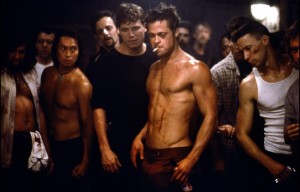 But then, I guess I’d prefer to be Brad Pitt in most situations.
But then, I guess I’d prefer to be Brad Pitt in most situations.
—
Brian Terrill is the host of television show Count Gauntly’s Horrors from the Public Domain. You can keep up with Brian’s 100 Film Favorites countdown here.


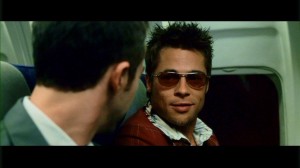


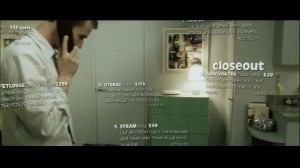



Tyler did not exist but only in the narrator’s faustrations and pent up rage, he didn’t exist.